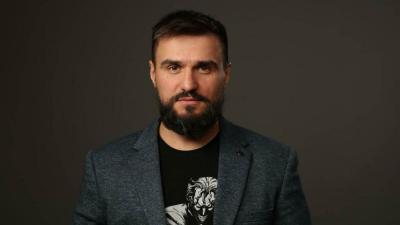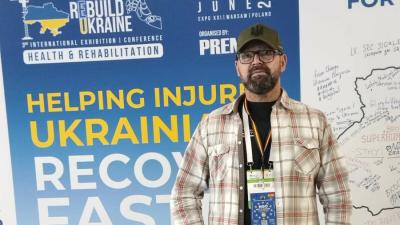“Russia has no interest in ending this war, and only by understanding this can we deal with the Kremlin”: An Interview with Olexsandr Shulga
Russia reminds us every moment, through brutal and horrible acts, of what awaits us if we surrender: the end of our national identity and the murder of all those who, politically or culturally, embody the Ukrainian nation.
In this interview, Dr. Oleksandr Shulga, director of the Institute for Studies and Analysis of Russian Conflicts (IKAR), explains the Russian view, both popular and official, on the war and President Donald Trump’s peace plans. We also discuss how the attitude of the U.S. administration is viewed in Ukraine.
Álvaro Peñas: A month ago, the Kursk situation and the economic situation were the main problems for Russians. What are the Russians worried about now? How do they see Donald Trump?
Oleksandr Shulga: Russians are still worried about economic problems and the prolonged duration of the war. Economically, wages and pensions remain low and inflation continues to rise. Despite the recovery of the ruble, Russians are pessimistic about an improvement in the economic situation, even more so with the drop in oil prices. Of course, they are hopeful about the negotiations, which are attracting a lot of attention, and think that Trump will somehow manage to achieve a favorable peace for the Russian Federation. This is the only real difference from the previous situation, the hope that Trump can reach a peace agreement and end the sanctions against Russia. Details such as the refusal to condemn Russian war crimes or the respect with which he treats Putin make Russians look at the US president with optimism.
What is the Kremlin’s vision?
The Kremlin is confident in the possibility of being able to use Trump as a tool to bend Ukraine. For that reason, Putin seems to accept the U.S. administration’s premises for peace, while doing exactly the opposite and making completely unacceptable demands. Because of this moderate optimism, the Kremlin speaks with great respect for Donald Trump and takes on many of his narratives, such as that there would have been no war had Trump remained in office. Of course, the Russian leadership is delighted that people like Witkoff, Trump’s envoy to negotiate with Putin, repeats point by point Russian propaganda narratives, such as referendums in occupied areas. Russia considers it a great success of its diplomacy that it managed to replace Kellogg on the negotiating team with an incompetent like Witkoff. It is insane that the Kremlin can dictate who is or is not on the U.S. negotiating team.
How does Russian propaganda approach Trump’s stance on the war?
Russian propaganda has made it taboo to criticize Trump, and it is not possible to see negative mentions of the US president in the official media and on most military channels. The narrative is in favor of a ceasefire and a peace agreement, but, and this “but” is very important, with totally maximalist or absurd conditions, such as the surrender of Ukraine or the dismantling of its army. The propaganda insists that Russia is for peace and did not start the aggression, and for them it is very important that Trump recognizes this. Basically, Russians are told that their country is a great power and can sit at the same table with China and the United States to decide what to do with the rest of the world, unlike the decadent European countries.
Among these absurd proposals, “denazification” continues to be insisted upon as an excuse to oust Zelenski from the presidency.
Yes, Russian propaganda insists on presenting Ukraine as a country that does not want peace and will not accept any reasonable agreement, and that Zelenski is ultimately responsible for this war. This is happening, according to the Russian media, because the Ukrainian president wants to maintain his power and preserve his personal interests. At this point the message of “denazification” is used again, because it must be understood that the strategic narrative has not been abandoned, even if it has taken a back seat after the peace.
Do you think that Trump’s attitude is a disappointment or even a betrayal for Ukrainians?
Regarding the Ukrainians’ view of Trump, I like to use a phrase of Winston Churchill: “You can always trust Americans to do the right thing after you have exhausted all other possibilities.” Ukraine is important to this administration, but Trump is making all the mistakes of many other politicians and diplomats who have negotiated with Russia. In his campaign, Zelenski claimed that the way forward was peace with Russia, a peace that his opponent Poroshenko could not achieve. However, less than a year after winning the election, Zelenski understood that negotiating with Putin was impossible. If we look at Putin’s more than twenty-five years in power, we see that anything less than increased pressure will come at a very high price for Ukrainians, Europeans, and even Americans themselves. Russia is already showing that it has no interest in ending this war and that there is no going back, and only by understanding this can we deal with the Kremlin. The statements of Marco Rubio or Trump, who claim that they are tired of this war and are thinking of “getting out of the way”, are totally unrealistic, because in that case the war will escalate even more and if it is not stopped, everyone will suffer the consequences. To believe that recognizing “de jure” Russian sovereignty in Crimea or the occupied territories will bring us peace and bring us back to the beginning of the 21st century and end the cycle of death and destruction is a big mistake. History teaches us that we do not learn from history, and some are still determined not to learn.
If the United States threatened to withdraw all its support, would Ukraine be willing to accept an unjust peace?
We Ukrainians need to save our relations with America as much as possible, but for us nothing has changed, and the Russian demands prove it: this is an existential war. If Russia withdraws, the war is over, but if Ukraine gives in, it ceases to exist. Russia reminds us every moment, through brutal and horrible acts, of what awaits us if we surrender: the end of our national identity and the murder of all those who, politically or culturally, embody the Ukrainian nation. We have already had this experience in the last century, and anyone who believes that Ukrainians will stop dying after surrender is naive. We have seen that many Ukrainians were tortured and killed, and others were sent to new gulags; the inhabitants of Donetsk and Lugansk were turned into cannon fodder and ruthlessly thrown to the front; and Ukrainian children are being indoctrinated to become cannon fodder to be thrown on Poland or the Baltic countries in the future. We have no choice but to defend ourselves, it is a simple and existential choice.
We cannot accept propositions that undermine our very existence, such as the recognition “de jure” of territories brutally occupied and where all kinds of war crimes are committed. What message are we sending if we accept that? You can kill, rape and destroy, and you will be rewarded with new territories. Trump is going to be four years in office, but for us it is a matter of country, generations, culture and history, and that is far above the experience and life of one man.
Read also
Javier Benegas: “The Right has to defend its own ideas, not be the antithesis of the Left”.
Javier Benegas is a publicist, writer and editor. Co-founder of the newspaper “Vozpópuli”, he currently directs the digital media Disidentia.
Álvaro Peñas
Country Report: Spain, June 2023 - Right-wing coalition government closer than ever before
The regional and local elections of 28 May marked a change of course in Spanish politics
Álvaro Peñas
Interview with Ludwig Brühl - ADF (Alliance Defending Freedom) International
“There is no place in a free society for the punishing of individuals who share their peaceful and honest views on the important issues of our time”
Álvaro Peñas
José Manuel Candón: “Right now, Ukraine is the most heavily mined country in the world”
Those at the front are defending the freedom of those at the rear, and if the enemy should succeed in curtailing the freedom of the rear, then he would be winning.














Comments (0)